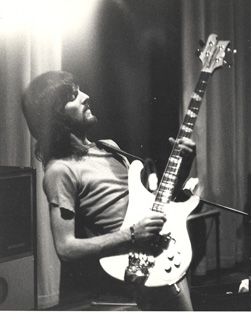
Brian Kilcourse in 1972
At first glance, working for a small IT consulting firm and playing in a full-time touring jamband may seem like two jobs that have little, if anything, in common. But for Brian Kilcourse and Steve Rowen, partners in technology advisory company Retail Systems Research (RSR) and veterans of the jamband circuit, the groove is where you find it.
“RSR is like a band with four distinct personalities and creative styles whose whole is greater than the sum of its parts,” says Kilcourse. “There is a great deal of give and take we must engage in and subordinate our egos to the brand. The brand is everything, drop the ‘r’ and the band is everything.”
“With four fairly opinionated people, we use the same process in devising a strategy for a client as you would in writing a song,” agrees Rowen. “Eventually, someone gets everyone to see their way. You learn when to be passionate. It’s like when you’re writing a song with your bandmates, if the bridge doesn’t matter to you but it matters to the bass player you let him have it. The process is surprisingly similar, but not as much fun,” he adds with mock woefulness.
Adding to the band atmosphere surrounding RSR is the fact that partner Paula Rosenblum is a onetime professional vocalist and partner Nikki Baird is known to strum some mean chords on her guitar. However, Kilcourse and Rowen both bring serious jam band bona fides to the business, albeit from different generations.
Like many musicians who grew up in the 1960s, Kilcourse’s infatuation with rock began when he first saw The Beatles. Unlike many of his generation who had to settle for watching them on a black-and-white “Ed Sullivan” broadcast, Kilcourse witnessed them up close and personal at The Hollywood Bowl in 1964.
“I was blown away,” recalls Kilcourse. “I said, ‘I have to do this.’ Of course, being about 13 at the time, I was more excited by the stadium full of screaming girls.”
Inspired by fellow lefty Paul McCartney, Kilcourse soon picked up the bass, although he had to learn to play right-handed so he could borrow instruments. After receiving a permanent draft deferment in 1972 that made him “suddenly free,” Kilcourse joined the jamband Mistress, which toured the nation for a few years, opening for major acts including Fleetwood Mac and Lynyrd Skynyrd. Some people may also recognize the name of Mistress’ lead guitarist Greg Douglass, who later played with performers including Hot Tuna and the Steve Miller Band.
When Mistress broke up in the mid-70s, Kilcourse, at this point married, decided it was time to get a “real” job. “In those days, you could get a job in an IT organization by fogging a mirror,” he says. So Kilcourse got a graveyard shift IT operator job whose main prerequisite was staying up all night, which he observes “any musician worth their salt can do with no problem.”


No Comments comments associated with this post